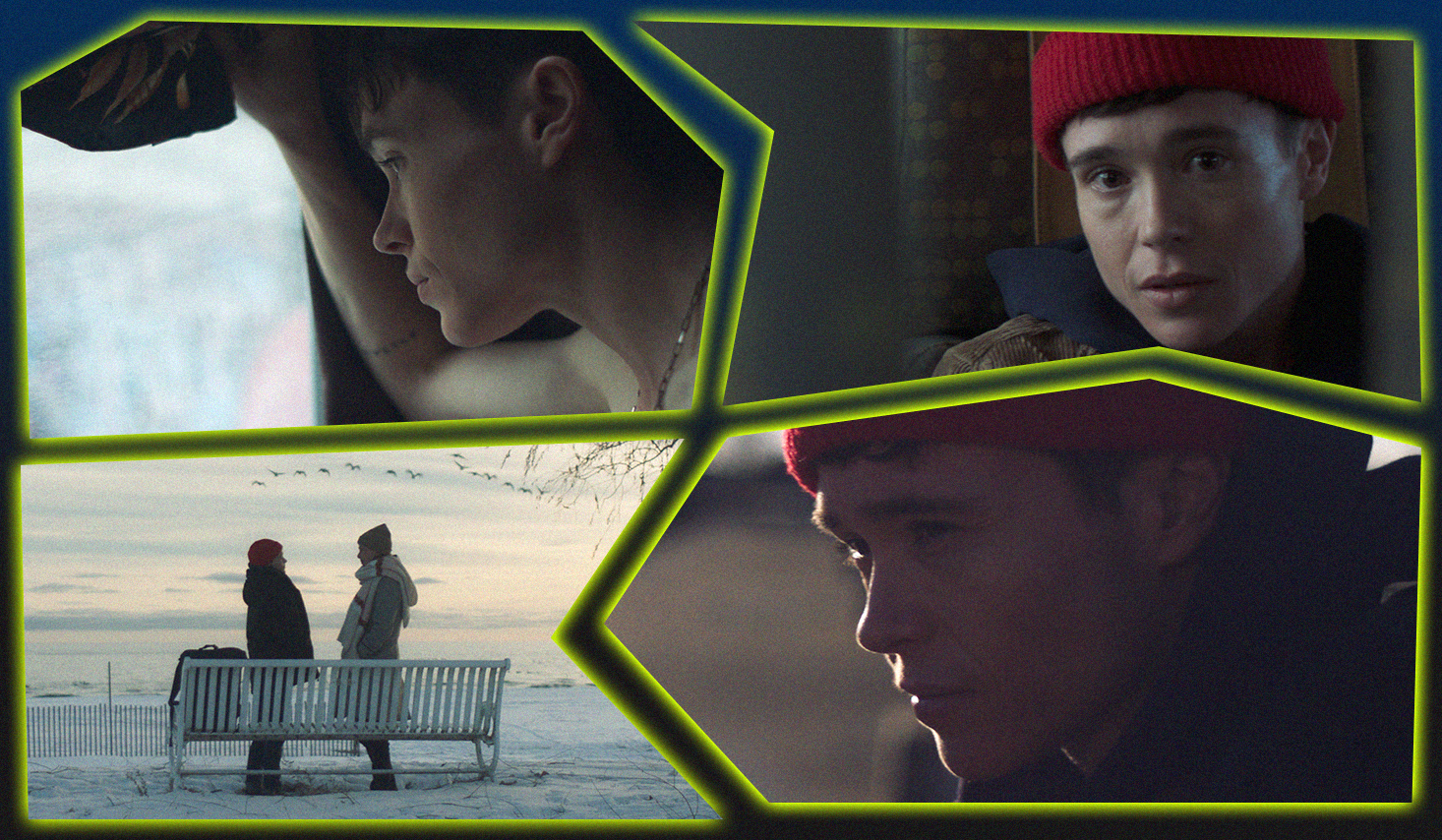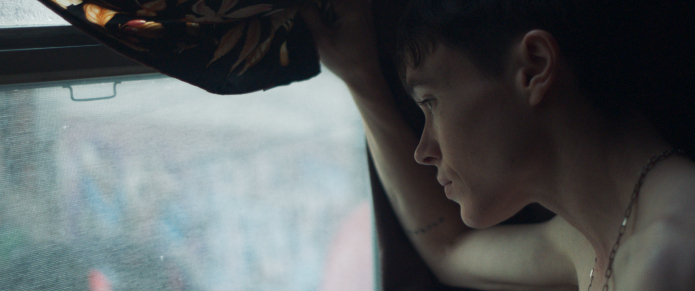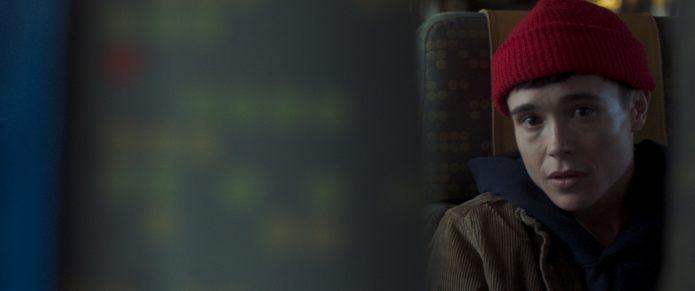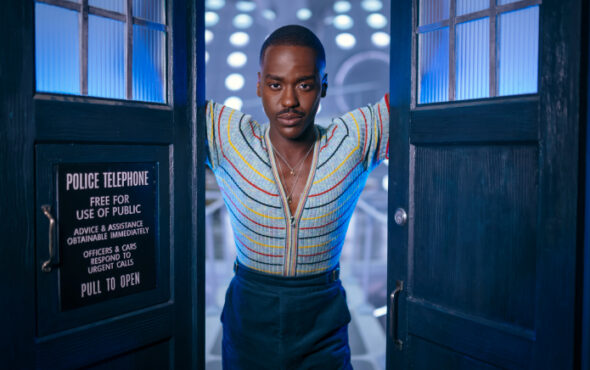
“In a time where there’s this massive push to essentially erase trans people, I really want to see people play those roles,” Elliot Page says ahead of Close to You’s premiere at the BFI Flare LGBTQIA+ Film Festival (14 March).
Standing up in the face of the “horrific misinformation” currently being spread about trans people, Page leads the independent drama as Sam, a trans man who has an unexpected run-in with old friend Katherine (Hillary Baack). With Sam visiting his family for the first time since his transition two years prior, Close to You explores the nuanced and often tumultuous experience a large proportion of LGBTQIA+ people experience re-entering a previously closeted space. It is also, as Baack tells GAY TIMES, “a perfect example of the importance of authenticity.”
Alongside Page and Baack, the film also stars Wendy Crewson, Peter Outerbridge, Janet Porter, Alex Paxton-Beesley, Daniel Maslany and David Reale.

Page wrote the largely improvised script alongside co-collaborator and director Dominic Savage in a drama that presents the deep personal joy of transitioning, rather than the strife that’s historically been depicted in mainstream media. “I just want to see more and more representation to help curb the horrific misinformation about our lives that’s causing devastating consequences,” Page says.
The unconventional crafting of the project turned out to be somewhat of a “spiritual experience” and allowed the actors to “transcend to this other world,” according to Page. Savage’s scripts lack dialogue and are just “description”, acting as a scaffolding for the actors to ad-lib lines. The scenes were “not cut after three minutes,” some could last “25 minutes so you’re really existing in this space”. Page explains how “there was a little bit about setting up certain dynamics, so knowing parents that accept Sam’s transness but are they really seeing Sam? Are they really listening to Sam?” This allowed the storyline to organically reveal that part of the struggles experienced by trans people is not about the transition itself, rather the lack of understanding from others and their difficulties with queer-inclusive language.

Savage explains to GAY TIMES how Sam’s brother-in-law (Reale) is “the typical cis guy that refuses to understand and actually has a possible deep seated fear [of trans people].” He embodies the “mockery” and “anti-feeling, yet a lot of people feel that way and I don’t think this is something that would ever really change. But I was also surprised at the compassion of the father, but there was only so far that he could go as well [in his support of Sam].”
The BAFTA winning director says “it’s vital” that we continue to see representation of trans people living a fulfilled life in the mainstream media: “That’s what was so good about Sam being fully transitioned, he’s leading his life his way and he’s made those choices. And they may not be easy for him, but he’s doing it. What I hope is that by the end of the film, that people get the sense of Sam having found a better place to be in his life.”
Intrinsic to the success of Close to You is the relationship between Page and Baack’s characters, a bond they began to cultivate in real life after “briefly” working together on The East thirteen years ago: “Our characters didn’t interact much. We were shooting this one scene one day, it’s not even in the movie, but these characters are doing this exercise and Hillary and I were just holding each other’s hands and looking each other in the eyes and we both started to just cry. And we’ve only progressively gotten closer ever since. So, we already have an inherent closeness, love for each other.”
This level of ease developed in the film where, prior to shooting, they discussed their character’s backstories to “create little memories in the back of our heads, but we left it pretty open,” Page recalls. Baack adds that she had “clarity” surrounding what her character “was dealing with at home even though that’s not necessarily on the screen”. The culmination of “a beautiful alchemy of all of those factors” created a safe space for each of their characters to explore their storyline on screen. “We were so in it, it was like going for a ride. Sometimes I would be surprised about laughing or crying, or Elliot’s reaction would sometimes surprise me a little bit. It was just this wonderful dance.”

“It’s so fun, I want to do it again,” Elliot responds. “I was surprised by the emotion a lot. I remember that first scene was shooting on a train. I don’t know why I’m crying. What’s special is you lean into those moments, because I actually didn’t. And there’s a line near the end of the movie that Hillary said to me [I’m so proud of you], when we’re lying in bed together, and it just slayed me.”
The casting of Page and Baack as their respective roles is important as their characters’ identities authentically align with the actors own lived experiences, however it is not what the entire plot is hooked upon. Katherine is a key part of Sam’s journey. “She’s from his past and her deafness is a part of her. But it’s not what the story is about, it’s not what she’s talking about,” Baack explains, “because in my life, I don’t go around talking about being deaf all the time. That’s not what I’m thinking about.
“And so often we see deaf characters who are often played by hearing actors, and often acting like they’ve just become deaf, even if they haven’t. It’s what they think about all day and the only thing that story is about and the only thing that the character has to offer. There is so much more to any deaf person than their deafness, and I really was so excited to get to play this part and just be this woman who yes, is deaf, but that’s not what it is about.” The Sound of Metal actor asks Page, “I’m sure that’s the same for you?”

“Obviously,” he replies. “Weirdly, on Them I just saw this video actually. And the person was breaking down the amount of cis-het actors who’ve been nominated for Oscars playing queer and trans roles, versus the amount of queer actors who [have], etc. And it’s not comparable, especially for those who actually win. We have to be sharing authentic experiences, stories and be giving people opportunities who historically have not gotten it whatsoever. And in a time where there’s this massive push to essentially erase trans people, I really want to see people play those roles.”
The Oscar nominated actor, who has amassed a 5.7 million Instagram following, is at the forefront of the representation he correctly advocates for. He says there is “such significant lack of representation for both of our communities. So it just means a lot to be in the position and to have the platform I have to be able to tell the story, and hopefully, it offers something to people that’s meaningful.”
BFI Flare LGBTQIA+ Film Festival runs until 24 March.


